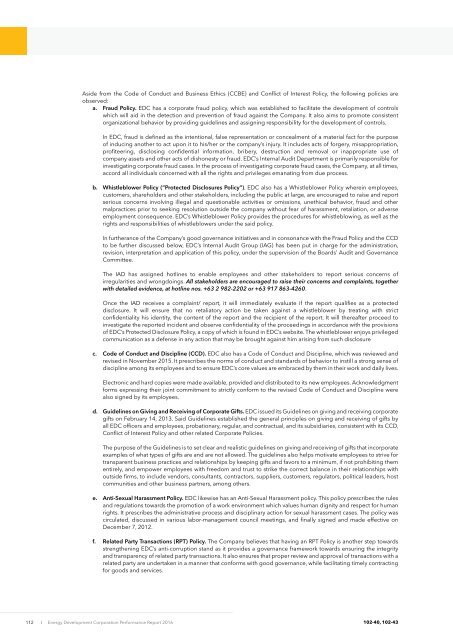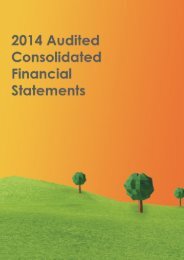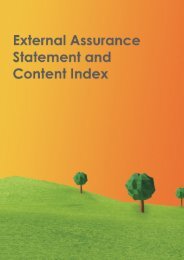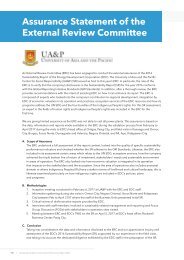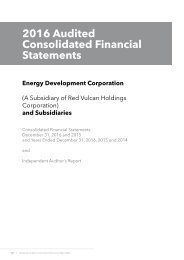EDC PR 2016 (CorpGov section)
You also want an ePaper? Increase the reach of your titles
YUMPU automatically turns print PDFs into web optimized ePapers that Google loves.
Aside from the Code of Conduct and Business Ethics (CCBE) and Conflict of Interest Policy, the following policies are<br />
observed:<br />
a. Fraud Policy. <strong>EDC</strong> has a corporate fraud policy, which was established to facilitate the development of controls<br />
which will aid in the detection and prevention of fraud against the Company. It also aims to promote consistent<br />
organizational behavior by providing guidelines and assigning responsibility for the development of controls.<br />
In <strong>EDC</strong>, fraud is defined as the intentional, false representation or concealment of a material fact for the purpose<br />
of inducing another to act upon it to his/her or the company’s injury. It includes acts of forgery, misappropriation,<br />
profiteering, disclosing confidential information, bribery, destruction and removal or inappropriate use of<br />
company assets and other acts of dishonesty or fraud. <strong>EDC</strong>’s Internal Audit Department is primarily responsible for<br />
investigating corporate fraud cases. In the process of investigating corporate fraud cases, the Company, at all times,<br />
accord all individuals concerned with all the rights and privileges emanating from due process.<br />
b. Whistleblower Policy (”Protected Disclosures Policy”). <strong>EDC</strong> also has a Whistleblower Policy wherein employees,<br />
customers, shareholders and other stakeholders, including the public at large, are encouraged to raise and report<br />
serious concerns involving illegal and questionable activities or omissions, unethical behavior, fraud and other<br />
malpractices prior to seeking resolution outside the company without fear of harassment, retaliation, or adverse<br />
employment consequence. <strong>EDC</strong>’s Whistleblower Policy provides the procedures for whistleblowing, as well as the<br />
rights and responsibilities of whistleblowers under the said policy.<br />
In furtherance of the Company’s good governance initiatives and in consonance with the Fraud Policy and the CCD<br />
to be further discussed below, <strong>EDC</strong>’s Internal Audit Group (IAG) has been put in charge for the administration,<br />
revision, interpretation and application of this policy, under the supervision of the Boards’ Audit and Governance<br />
Committee.<br />
The IAD has assigned hotlines to enable employees and other stakeholders to report serious concerns of<br />
irregularities and wrongdoings. All stakeholders are encouraged to raise their concerns and complaints, together<br />
with detailed evidence, at hotline nos. +63 2 982-2202 or +63 917 863-4260.<br />
Once the IAD receives a complaint/ report, it will immediately evaluate if the report qualifies as a protected<br />
disclosure. It will ensure that no retaliatory action be taken against a whistleblower by treating with strict<br />
confidentiality his identity, the content of the report and the recipient of the report. It will thereafter proceed to<br />
investigate the reported incident and observe confidentiality of the proceedings in accordance with the provisions<br />
of <strong>EDC</strong>’s Protected Disclosure Policy, a copy of which is found in <strong>EDC</strong>’s website. The whistleblower enjoys privileged<br />
communication as a defense in any action that may be brought against him arising from such disclosure<br />
c. Code of Conduct and Discipline (CCD). <strong>EDC</strong> also has a Code of Conduct and Discipline, which was reviewed and<br />
revised in November 2015. It prescribes the norms of conduct and standards of behavior to instill a strong sense of<br />
discipline among its employees and to ensure <strong>EDC</strong>’s core values are embraced by them in their work and daily lives.<br />
Electronic and hard copies were made available, provided and distributed to its new employees. Acknowledgment<br />
forms expressing their joint commitment to strictly conform to the revised Code of Conduct and Discipline were<br />
also signed by its employees.<br />
d. Guidelines on Giving and Receiving of Corporate Gifts. <strong>EDC</strong> issued its Guidelines on giving and receiving corporate<br />
gifts on February 14, 2013. Said Guidelines established the general principles on giving and receiving of gifts by<br />
all <strong>EDC</strong> officers and employees, probationary, regular, and contractual, and its subsidiaries, consistent with its CCD,<br />
Conflict of Interest Policy and other related Corporate Policies.<br />
The purpose of the Guidelines is to set clear and realistic guidelines on giving and receiving of gifts that incorporate<br />
examples of what types of gifts are and are not allowed. The guidelines also helps motivate employees to strive for<br />
transparent business practices and relationships by keeping gifts and favors to a minimum, if not prohibiting them<br />
entirely, and empower employees with freedom and trust to strike the correct balance in their relationships with<br />
outside firms, to include vendors, consultants, contractors, suppliers, customers, regulators, political leaders, host<br />
communities and other business partners, among others.<br />
e. Anti-Sexual Harassment Policy. <strong>EDC</strong> likewise has an Anti-Sexual Harassment policy. This policy prescribes the rules<br />
and regulations towards the promotion of a work environment which values human dignity and respect for human<br />
rights. It prescribes the administrative process and disciplinary action for sexual harassment cases. The policy was<br />
circulated, discussed in various labor-management council meetings, and finally signed and made effective on<br />
December 7, 2012.<br />
f. Related Party Transactions (RPT) Policy. The Company believes that having an RPT Policy is another step towards<br />
strengthening <strong>EDC</strong>’s anti-corruption stand as it provides a governance framework towards ensuring the integrity<br />
and transparency of related party transactions. It also ensures that proper review and approval of transactions with a<br />
related party are undertaken in a manner that conforms with good governance, while facilitating timely contracting<br />
for goods and services.<br />
112<br />
I Energy Development Corporation Performance Report <strong>2016</strong><br />
102-40, 102-43


